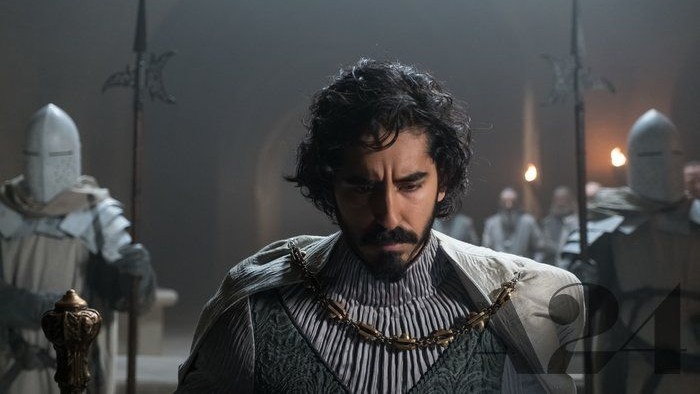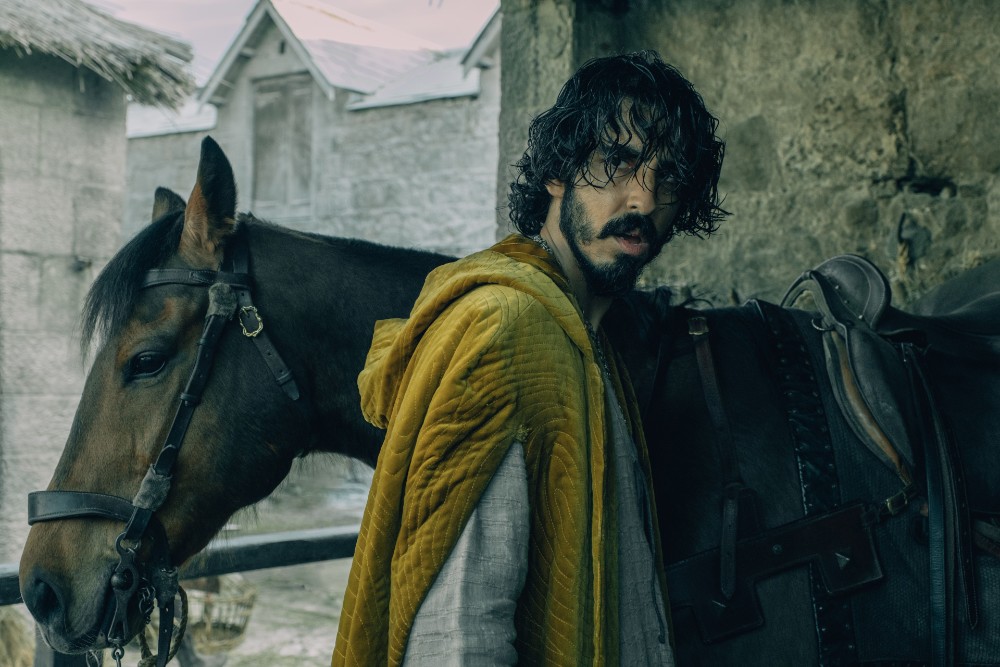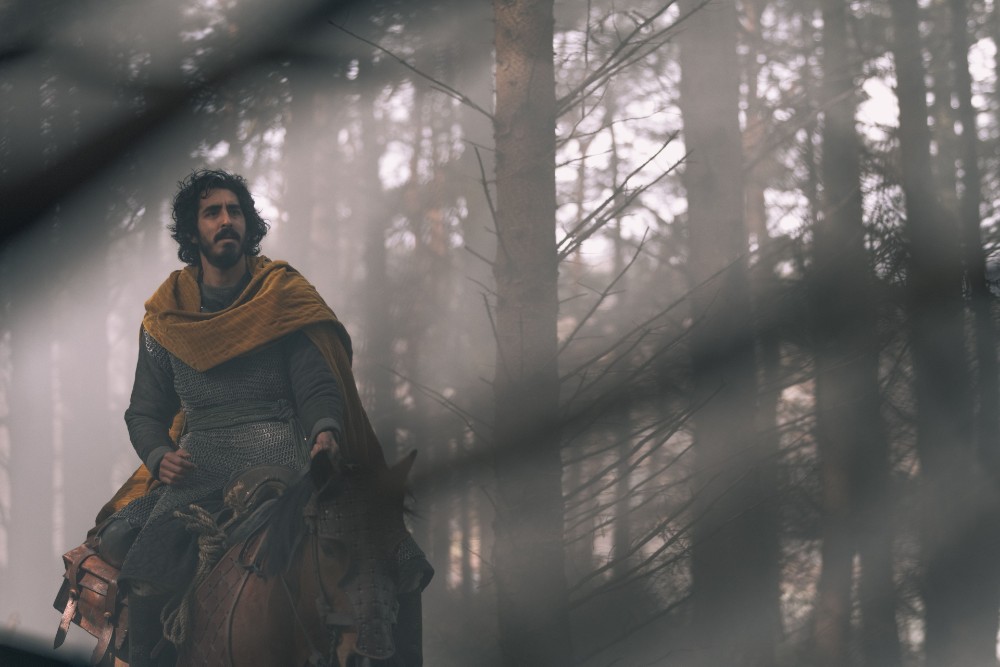
If you’re an avid fan of Director David Lowery’s films, whether it’s his early indies like Ain’t Them Body Saints to his big-budget Disney remake of Pete’s Dragon, or something smaller again like A Ghost Story, then you’re intimately familiar with the music of Daniel Hart. Hart and Lowery have been collaborating together on the musical component of the latter’s movies going back to 2009’s St. Nick, and that collaboration has led to some absolutely epic scores, but nothing like their most recent venture, The Green Knight.
The Green Knight, based on the 14th-century poem, Sir Gawain and the Green Knight, is a medieval fantasy film starring Dev Patel as Gawain, who is sent on an epic quest to confront the Green Knight who appeared in court to issue a challenge on Christmas Day. The film takes Patel’s character across the land meeting all sorts of strange and eerie characters (as well as an adorable bedraggled fox), but it’s driven by Hart’s score, which is next level in terms of the music and instrumentation used to create the proper historical context for the story.
Below the Line got on Zoom with Mr. Hart a few weeks back, and oddly, our conversation went into some of the same areas as our recent Composer Series with Harry Gregson-Williams, but also covered a lot of ground in terms of Hart’s collaboration with David Lowery.
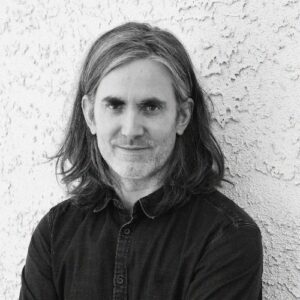
Below the Line: I know you’ve scored all of David Lowery’s movies, and I only recently learned about your TV work, but let’s start by talking about how you met David and started working with him, doing the music for all his movies.
Daniel Hart: We met through a mutual friend. We both grew up in Dallas, or both grew up in parts of Dallas. He grew up in Irving, and I grew up in a little suburb called Highlands, they’re at least 30 minutes apart from each other, so it’s not like we would have ever known each other growing up. We both grew up in Dallas, so we had a lot of mutual friends in Dallas. A person who ended up being his writing partner and a producer on most of his films, Toby Halbrooks, introduced us, Toby and I used to play in a band together called the Polyphonic Spree, a symphonic pop band with 26 members. When Toby left that, he started doing film stuff. I kept touring with other bands, and I had my own band as well, making my own music. He played some of that music for David, like in 2008, 2009, or something, and then I met David not too long after that. David really liked the music that I was writing for my band, and he asked me if I would consider writing some music for his first microbudget feature that he was working on called St. Nick. I’d never thought about doing film scoring. I was just trying to tour in bands, but I liked him, and I like the movie, and some ideas popped into my head. So, I wrote a couple cues, and that was the beginning.
BTL: What was your main instrument when you were playing in bands?
Hart: I started on the violin when I was a little kid, so that’s my main instrument in life. In bands, I did play quite a lot of violin as well. I also played a lot of guitar, viola, synths, bass did a lot of singing, and occasionally drums.
BTL: Classic multi-instrumentalist who would get called upon whenever someone needed a musician, basically.
Hart: Yeah, that’s the idea. I never learned to play any wind instruments. That’s my weakness.
BTL: Did you actually go to school for music or for composing? Were you able to at least read music from your time playing violin in school?
Hart: I played in orchestras all through high school, but once I got to university, I wasn’t interested in pursuing classical music. I wasn’t thinking about film scoring yet, and there weren’t a lot of options for jazz violin. There were some but not ones that I could easily make a part of my life. I followed my other passion, which was theater, and my degree was in playwriting, which I hadn’t thought of at the time. Looking back now feels like it’s really well suited for my current job. Like I have an interest in plot and character development and motivation and storytelling structure.
BTL: You’ve been working with David for so long, and I spoke to the VFX Supe for The Green Knight, who also did Pete’s Dragon, and he said that Green Knight was something on David’s plate for a while. At what point does he tell you about it, and you start thinking about it?
Hart: He thinks ahead more than me. I’m not a part of the writing process at all, so I usually find out about things either when the script’s almost done or the script’s already done, and he’s been sending it to people. He usually starts the conversation with me pretty early on, in terms of how it usually goes. Usually, I get hired in post-production or they’re almost done filming. To be there, right from the beginning of script writing, that that feels pretty early. I usually visit the set on David’s films if I can, which I don’t usually do on other projects.
BTL: Green Knight was pretty much done before COVID hit, right? I remember it was supposed to come out in April or May 2020, maybe?
Hart: I think the release date was Memorial Day weekend, it was supposed to come out. We finished the film in January of 2020, and then David wasn’t happy, so he went back and he made a bunch of changes, then we finished it again in March of 2020, maybe like a week before lockdown started in the US. Or maybe a couple days before lockdown strike, and then the pandemic, and A24 was really invested in releasing the film in theaters at a time when they thought people would go see it in theaters, so they delayed the release. And when they did that, David still wasn’t quite happy with this film and went back and started making more changes. So we finished it again in October of 2020, and then it came out.
BTL: That’s one of the bad parts about the pandemic. If you give a filmmaker a deadline, like say Sundance, they have to have it done, but when you delay it a year or more, it’s a little dangerous for filmmakers who like to tinker.
Hart: Yes, and the fact that he was editing the film himself meant that it didn’t take anything for him to decide. It was just him asking himself, “Well, what do you think, David? Should we edit the film some more?” “Well, I don’t know, David, I guess we should.” “Well, okay, let’s do it, then.”
BTL: If he’s re-editing stuff, do you have to redo the music or is it a matter of just trimming stuff and trying to get stuff you’ve done to match the edits?
Hart: There were some big chunks of the score that had to be redone, because the edit ended up changing so much. It’s not like I was seeing new footage. It just got recut in a way that the old score didn’t make sense anymore. There was a bunch of stuff that was redone, there was some repurposing. We had recorded quite a lot of choir for the film already, but David really loved that aspect of the score so much that we ended up taking a bunch of that choir and multiplying it in other places in the score where it hadn’t existed before, and then we needed to do more vocals, but putting a choir back together in the pandemic is the worst or most dangerous thing that you could do at the beginning of the pandemic, so. I hired a friend of mine, Katinka Vindelev, who is an amazing Danish soprano, and she had worked with me on the score for The Exorcist, the TV show, and she worked with me on A Ghost Story. She sang on that one as well, so I hired her to come in and do some more soprano choral-esque singing on a few cues.
BTL: Knowing your background with the Polyphonic Spree, all the choir stuff makes sense now. When I first heard the score, I thought it was very different from all the other stuff you’ve done, but you’ve been able to draw from stuff you’ve done in the past as well? It’s a very specific type of music for that period.
Hart: It goes back even further than that for me, because both of my parents are choir directors, and they both were church musicians and did church music with choirs for their career. I sang in those choirs when I was a little kid, and that stuff is just in my brain. It’s just in there forever. So there are a lot of religious undertones in The Green Knight that pop up here and there. This idea that it’s like Garwin’s Christian city life butting up against The Green Knight‘s pagan world out in nature means that there’s a juxtaposition that requires something that feels like 1400s religious music to me. I was drawing on stuff from my childhood to create a lot of that stuff.
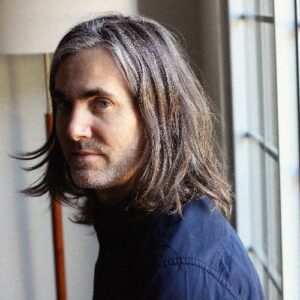
BTL: Going back to what we were talking about before, do you have a Pro Tools system where you can actually cut parts up and move them around to match a new edit? Or do you still go to a studio and work with an engineer?
Hart: I work in Logic, and I do a lot of stuff at home, depending on the size and the scope of the film and maybe doing most of the stuff at home on my own. A Ghost Story is like 90% me at home, in terms of the score, and even though the budget on Green Knight was much, much bigger than there was on A Ghost Story, which was no budget. We recorded a lot of the score for The Green Knight at AIR Studios in London, but even still, I did a lot of stuff at home. I recorded all the violins and violas for the score myself. We had a cello section in London, but I did the higher strings and then there’s Swedish medieval instrument called the Nyckelharpa that is in the score quite a lot. I had one of those built for me, and then I learned how to play it and some other stuff I did at home too. I like to tinker, and I like things to feel like they’re homemade, even on bigger films, so yeah, I did a lot of stuff at home.
BTL: Listening to some of your TV scores, I was hearing lots of interesting sounds and instruments. I’m always trying to figure out whether things are real or samples or synthesizers when I listen to scores, and I heard some really interesting things in your TV scores.
Hart: I’m having a lot of fun. It’s been a wide variety of projects that people have asked me to do, and that is very gratifying, and it’s a big compliment to me that people think I would be capable of doing a horror TV show and an irreverent comedy like SMILF and a drama with a very kind of epic implication like Strange Angel.
BTL: In the work you’ve done with David, you’ve never really made the same film twice. It’s always fascinated me to see David go from Pete’s Dragon to A Ghost Story, which are such different movies. He clearly likes mixing things up and the variety. Are you the same?
Hart: Yeah, he likes variety. I really like variety. He wants the films to feel different, and he wants the music to be different. I really enjoy the challenge of making something that feels like it belongs in the worlds that he’s created, and those worlds demand different kinds of music. I’m lucky to have had an experienced education in and interest in lots of different kinds of music.
BTL: For The Green Knight, are you doing a lot of research into those instruments? What are you doing to prepare besides having instruments built and learning how to play them?
Hart: I did more research for The Green Knight than I’ve done for any film that I’ve worked on. It’s a medieval fantasy, and I’ll watch fantasy films, medieval films, and medieval fantasies all day long. I really enjoy those films, but I’d never done one before. There was a lot of lyrics that needed to be written for the film in various scenes. It felt to me like those should be in Middle English, and I didn’t know anything about Middle English. I did spend a long time reading and listening to Middle English poetry being recited, to get a feel for the words and how they sound and how they’re different from the way that we pronounce things now. And then, yeah, this instrument, I learned how to play it, and there’s a recorder quartet that also has a prominent place in the score. I played the recorder as a little kid — a lot of kids did — but this is some much more advanced playing. I felt like I didn’t really know anything about that. I just knew that I wanted to have that sound in the film, so I did a lot of research there.
I listened to a lot of medieval recorded music, but I also wondered if there was modern recorded music being made? And is there weird stuff happening on with recorders? And so I started searching for that and found that pretty easily, but then getting to understand how those weird sounds are made took a bit more time and research. I’m really grateful that there were people. There’s a British woman who has a YouTube channel called Team Recorder. Her name is Sarah Jeffery and she talks about recorder technique and how recorders work. I learned a lot from her, and then there’s a Dutch composer, because the modern recorder scene is focused very heavily in the Netherlands, like there’s much more going on there than anywhere else. And there’s a Dutch composer named Michiel Mensingh, who composed a lot of modern works for recorder that are weird and awesome, and use a lot of extended techniques, a lot of honking and groaning and stuttering, a lot of stuff that I used in the score for The Green Knight.
BTL: I spoke to Harry Gregson-Williams a few weeks ago, who scored the latest Ridley Scott movie, The Last Duel, set in the 14th Century France. I asked him a similar question but also asked him about the pipe organ which might not have been period-specific, but it sounded good. (I’m paraphrasing a bit.) Obviously, he didn’t literally learn Middle English, although it has vocals as well, kind of madrigal singing.
Hart: It was important to me to have some stuff that was period-specific, like they had recorders in the 15th century, and they had something like a Nyckelharpa, maybe? That was the language being spoken. It’s all relative, really. The poem was written in the 1400s, but anybody who resembles someone like King Arthur and the Knights of the Round Table, would have been alive in the 800s, so we took liberties with the storytelling to put it in the time period of the poem itself. It may have been anachronisms to the 800s. Both David and I decided it needed to be set in the 1400s instead, which is a lot easier musically. There’s a lot more variety of instruments to choose from in the 1400s that we know about.
BTL: You mentioned learning Middle English for the singing, so did you go back to the poem and use any of the actual text from the poem in the score, as well?
Hart: I did not. I listened to that poem. I listened to a bunch of poems after listening to Sir Garwin and the Green Knight, but I wrote all the lyrics myself. No, that’s not true. There’s one song on the soundtrack called “Child Thou Ert a Pilgrim,” that actually does not appear in the film, because that scene got cut. But that is directly taken from the 1400s. But otherwise, I wrote all the lyrics myself. The poetry that I was reading didn’t quite match up to what I was looking for, so I ended up making myself a little dictionary of all the words that I really liked, like the way they sounded or the way they were spelled, or the ways they were different from the way that we pronounce things now, especially things that really demonstrated the heavy Scandinavian influence on Middle English that’s almost completely gone from the way that we say things now. There’s a track in the film called “O Nyghtegala,” which just means “O Nightingale,” but “Nyghtegala” has such a foreign and captivating sound to my ears. I’d never say anything like that when I’m thinking in words now. “Nyghtegala” was the first thing that I wrote for the film, because David said he wanted a lullaby for one of the scenes in the film for a woman to sing while a woman was giving birth, so I made my little dictionary of words that I liked, and then wrote the lyrics from that dictionary.
BTL: Are there any Easter eggs if someone actually understands Middle English, they’ll hear something?
Hart: The song that runs at the beginning of the end credits is called, “Be Merry, Swete Lorde.” It was a song written for the film, another scene that got cut. There was a scene in the brothel where a sex worker is washing her clothes, and she’s singing this song to herself while she does it. And it’s really bawdy. It’s a song about sex, basically, and it’s all euphemisms, so there’s that. Beyond that, I don’t think so. I was really pleased when a couple of people who are in some way or another medieval scholars, like they’ve studied or taught medieval literature, responded on Twitter to say that they felt like it was accurate or accurate enough that they really enjoyed that there was Middle English stuff in there.
BTL: What have you been doing since finishing The Green Knight? Have you started working on David’s next movie, Peter Pan & Wendy, yet? Is that still fairly early and are you working the music while he’s shooting or not really?
Hart: Yeah. Especially with this one, because we wanted to do it without any temp music, as I started really early on, on Peter Pan & Wendy. Yeah, I’ve been working on it. I started and did a little bit of stuff in February, March and April, but I really started in August. I was working on another film in between. There’s a documentary about Fauci, it’s called Fauci. It’s on Disney+. It was such a rush. There’s like 90 minutes of score in the film, and I had about two months to do it, so I had to set Peter Pan & Wendy aside, to knock that out and started back full on in August. We don’t record the orchestra until March of next year, so I’ll be working that whole time, just on Peter Pan & Wendy. I turned down a couple of other possibilities, because I really wanted the time to work on this thing. It’s going to be pretty much non-stop music, and it’s about two hours long. That’s a lot of big orchestral and big choir stuff for me to write, so I need all that time to get it done the way I want it to be. After that, I start on a TV show version of Interview with the Vampire. It’s the same showrunner as The Exorcist TV show that I did a few years ago. He knows more about contemporary classical music and contemporary experimental, classical music than anybody in Hollywood that I’ve ever met. He’s a real joy to work for.
BTL: I’m always curious when I talk to different composers how knowledgeable the directors they work with are about music, and if that’s helpful or more detrimental?
Hart: I think most of my experiences have been with people who don’t know a ton about music, but as long as directors are able to communicate what it is that they like, or don’t like, or want in some way or another. If they’re just using adjectives to describe how it makes them feel, or describing their emotions in reaction to the music, that’s usually enough for us to find some common ground to talk about stuff. David is not a musician himself, but he’s taken the time to learn some musical terms and vocabulary, and he can speak to me in ways that are relevant to the score in more specific ways than some directors can. I’ve had some experiences where, like if someone played an instrument in junior high and haven’t really done something since, they’ll use a musical term, incorrectly and then there’s a bit of confusion, because I have to figure out what they actually mean or what they actually want, as opposed to what they’re saying. But most of the time, people either talk about music in specific musical terms or not at all. Either way, it seems to work out all right.
BTL: Are you able to work on multiple music projects at the same time? I know a TV series is a big commitment, so can you go back and forth between those projects with the films you’re scoring? Or are you just one project at a time?
Hart: Most of the time, I’m working on multiple things. I still have my own band, for which I’m writing music, and we were touring quite a fair amount. We were touring a few months out of the year, every year from 2013 through 2018, so most of the time that I’ve been scoring films, and so I would be working on some scores from the road sometimes. But yeah, working on at least a couple projects at a time is what I’ve been doing for most of the time that I’ve been scoring. But Peter Pan would be an exception to that. When we were doing Pete’s Dragon, I was also working on the pilot for The Exorcist, and those are some really long days back in 2016, trying to get both of those things done at the same time,
BTL: Before I let you go, what’s the name of your band?
Hart: It’s called Dark Rooms, and we put out a couple of albums and one of our songs is in A Ghost Story, it plays a part in the film as a song that Casey Affleck‘s character has written.
The Green Knight is being released into theaters across the country today, but you can also hear Hart’s score on all the good streaming services like Spotify, plus it’s available on CD and vinyl as well. You can read J. Don Birnam’s review of the film, and his interview with the film’s Costume Designer.
All The Green Knight photos courtesy and copyright A24; other photos as noted.

